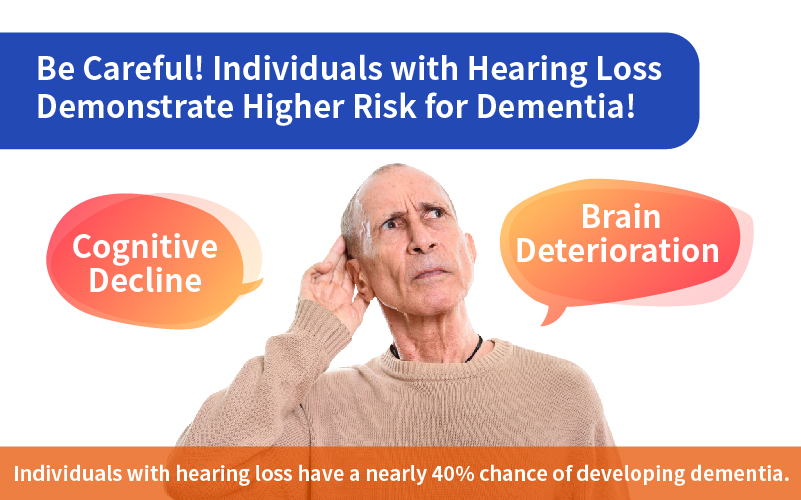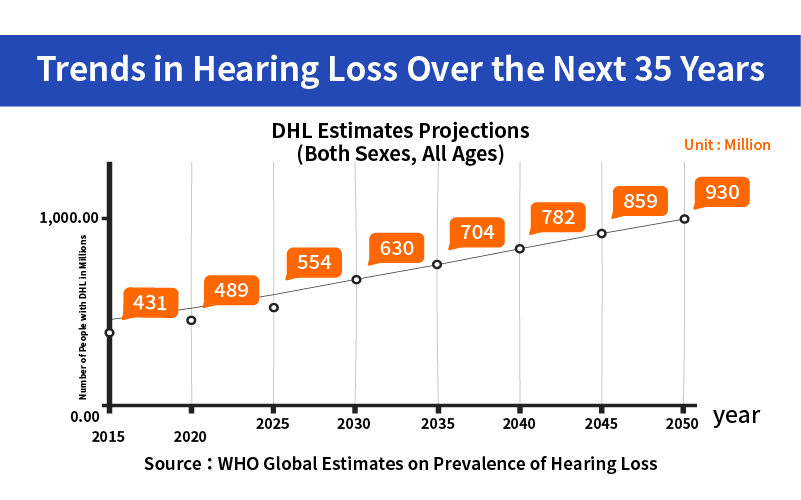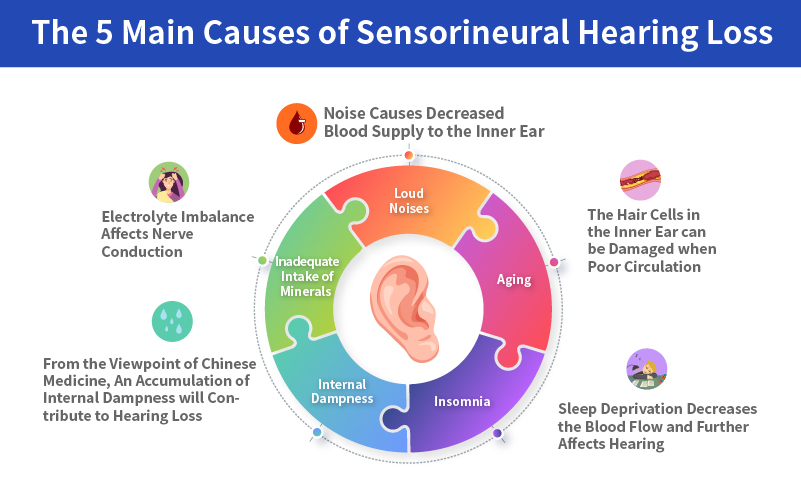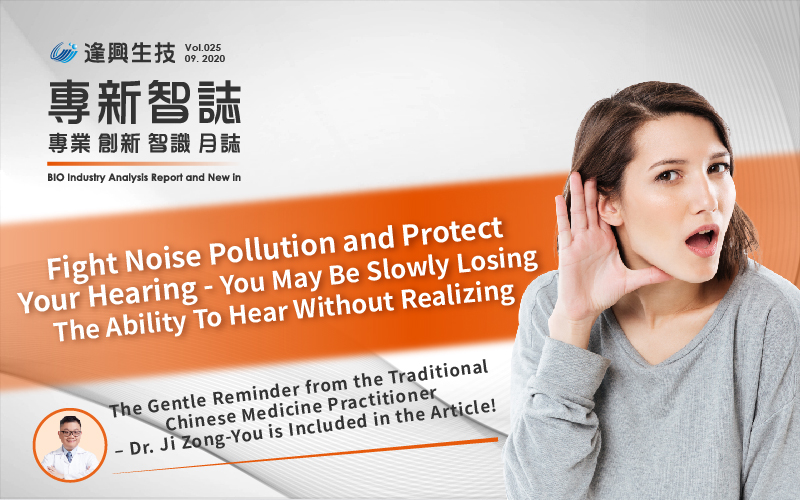Healthy Hearing Plays A Role In Dementia Prevention
Hearing loss often gets ignored; however, the concern has been growing recently. In addition to the worsening situation of noise pollution, many research have discovered the correlation between dementia and hearing loss. The research from The Journals of Gerontology [1] in 2011 indicated that hearing loss could be a sign of cognitive decline. When hearing loss takes place, individuals would have to concentrate more to understand what they are hearing, which speeds up the brain degeneration. Hearing difficulties may stop individuals from social activities, affect communication, and further impair the cognitive functions. The individuals with hearing loss are facing 40%[2] chances of developing dementia; therefore, hearing loss has come under the spotlight worldwide.

Noise Regulation Are Established To Stop The Increase In Hearing Loss
Noise has become one of the main causes of hearing loss in recent years. Like air pollution, noise pollution is the byproduct of economic development that could seriously harm human health. WHO announced Guidelines for Community Noise [3] that not only lists the harm of noise pollution on human health, but also takes force on the management of environmental noise. WHO also reported that over 6.1% [4] of the world’s population – about 466 million individuals are suffering from hearing loss and 34 million among them are children. By 2050, over 900 million people – or one in every ten people are estimated to be experiencing disabling hearing loss. Approximately one third of the people over 65 years old are affected by hearing loss and the number is forecasted to continue increasing.

Many changes in lifestyle such as the prevalence of smartphone usage, constantly wearing headphones, setting the volume to unsafe levels, attending recreational events such as nightclubs, bars, sporting events, and concerts could damage our hearing ability. People are exposed to loud noises in these environments and more than 1.1 billion teenagers and young adults aged from 12 to 35 are at the high risk[5] of losing their hearing.
As the number of cases keeps increasing, noise pollution has become the issue that the governments worldwide focus on. The Parma Declaration from 2010 worked on protecting children’s health in a changing environment and emphasized on the chances of their exposure to loud noise. WHO sets the guidelines on the issue multiple times to encourage both local and international government to work on noise management. In addition to controlling environmental noise, WHO also limits the maximum volume on smartphones and music players to advise hearing protection. The Noise Control Act already took place in Taiwan in 2008 to maintain public health and a quiet environment. Apple also does a research[6] on the factors that cause unhealthy hearing to act in cooperation with WHO, planning to stop the global condition of hearing loss from getting worse. All the international organizations, governments, and enterprise join forces to promote healthy hearing.
Although the governments and organizations worldwide are working together to enforce noise control and related legislation, noise pollution still impacts millions of people on a daily basis. Exposure to loud noise affects to all age groups including elderly adults and children, which gradually brings hearing health back into the spotlight.
Hearing Loss Is Irreversible – Promoting Healthy Hearing Starts From Your Living Habits
Are you wondering whether you have hearing loss? Try to recall if you have the following conditions such as having tinnitus, often asking others to repeat, having trouble following conversations in noisy situations, and needing to turn up the volume of the television. The forementioned conditions are the signs of hearing loss, which may lead to deafness or dementia if getting worse. There are three types of hearing loss: conductive hearing loss, sensorineural hearing loss, and mixed hearing loss. Conductive hearing loss occurs when there is an obstruction or damage to the outer or middle ear such as trauma, infection, blockage of ear canal, or otitis media. It is temporary and the hearing could be treated with surgery or medicine. The most common type is sensorineural hearing loss that comes on gradually as a person gets older or occurs when there is damage to either hair cells or the auditory nerves. Hearing loss is irreversible since hair cells cannot regenerate; therefore, we should be alert for signs of hearing problems and put more effort in protecting hearing.

The health of inner ear is mainly affected by blood circulation. Smooth blood circulation maintains active hair cells and stable neural system, permitting efficient nerve conduction. A few factors that may affect the blood circulation in the inner ear are listed as the following:
1. Loud Noises – Noise causes decreased blood supply to the inner ear and staying in noisy environments for prolonged periods affects hearing.
2. Aging – The decrease in hearing ability also happens with age. Poor blood circulation damages the hair cells, which leads to hard of hearing symptoms.
3. Insomnia – Sleep deprivation affects the blood vessel contraction and slows down the blood flow, which further contributes to hearing difficulty.
In addition to the forementioned factors, inadequate intake of minerals may cause electrolyte imbalance which slows down nerve conduction and from the viewpoint of Traditional Chinese Medicine, the accumulation of internal dampness would contribute to hearing loss.
Better hearing health should begin with engaging in healthy lifestyle habits such as replacing the in-ear headphones with over-ear headphones, listening to the music at lower volume with a break taken every 30 to 40 minutes, and wearing ear protection when being around loud or constant noises. Getting right amount of exercise also plays a role in maintaining healthy hearing. Exericising could reduce hearing problems by increasing energy level, stimulating blood circulation, expelling dampness, enhancing sleep quality, and delaying aging.


From the viewpoint of Traditional Chinese Medicine, deafness indicates different levels of hearing loss. Two main types of hearing loss were recorded in the ancient TCM literature – sudden hearing loss that occurs as a rapid loss of hearing and progressive hearing loss which the hearing loss gets worse over time. Other types of hearing loss may be due to exhaustion, sleep deprivation, hypoxia, poor blood circulation, and yin and yang imbalance.
The ear is the organ of hearing and considered to be the opening of the kidney on the body surface. Hearing relies on the nourishment of kidney essence. The abundance in kidney essence promotes vitality and the proper functioning of the five organs. From the perspective of TCM, kidney essence is a source of the marrow and the brain is a sea of marrow to maintain normal mental function and acute hearing. When there is deficiency, the symptoms of tinnitus and hearing loss can happen. Presbycusis has been regarded as a model of kidney deficiency deafness in TCM. Furthermore, decreased hearing may result from phlegm-fire stagnation, poor blood circulation, or accumulation of internal dampness.
The best remedies for healthy hearing are to expel dampness, clear phlegm, promote healthy descending of the stomach energy, enhance blood circulation, and nourish kidney essence.
Wel-Bloom Takes the Hearing Supplements to the Next Level with Careful Selection of Safe and High-Quality Ingredients
Wel-Bloom Bio-Tech utilizes professional knowledge to produce the formula that provides the crucial nutrients to avoid noise pollution.(For more details on this article please visit Wel-Bloom News, the next chapter of “Vol24: Fight Noise Pollution And Protect Your Hearing – You May Be Slowly Losing The Ability To Hear Without Realizing -Part Two“.)
To retrieve passwords please fill in the form or email us at, service@welbloom.com.tw, and our sales representative will get in contact with you as soon as possible.
Wel-Bloom Bio-Tech, experts in dietary supplement foods research and development in Taiwan
